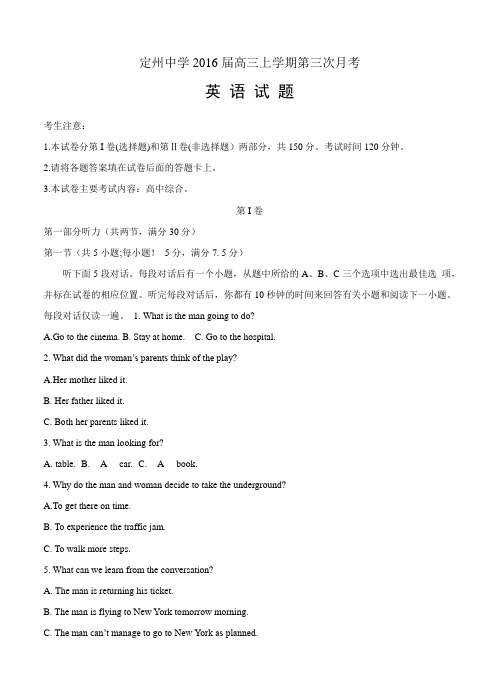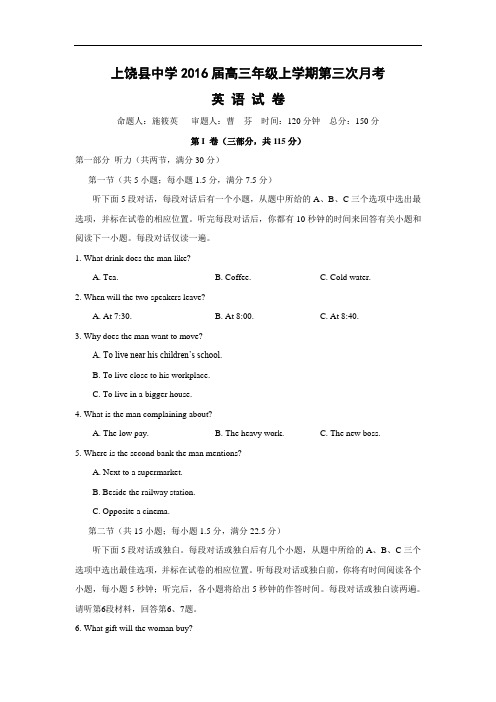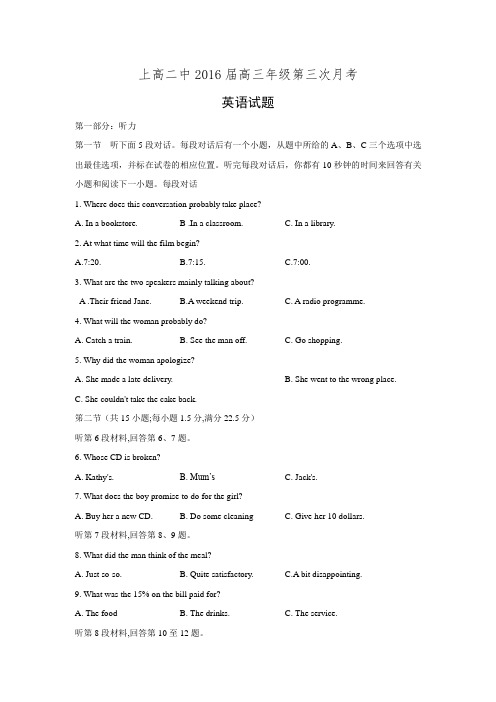高三英语月考试题及答案-赤峰二中2016届高三上学期第三次(12月)月考
- 格式:doc
- 大小:30.67 KB
- 文档页数:9

定州中学2016届高三上学期第三次月考英语试题考生注意:1.本试卷分第I卷(选择题)和第Ⅱ卷(非选择题)两部分,共150分。
考试时间120分钟。
2.请将各题答案填在试卷后面的答题卡上。
3.本试卷主要考试内容:高中综合。
第I卷第一部分听力(共两节,满分30分)第一节(共5小题;每小题!5分,满分7. 5分)听下面5段对话。
每段对话后有一个小题,从题中所给的A、B、C三个选项中选出最佳选项,并标在试卷的相应位置。
听完每段对话后,你都有10秒钟的时间来回答有关小题和阅读下一小题。
每段对话仅读一遍。
1. What is the man going to do?A.Go to the cinema.B. Stay at home.C. Go to the hospital.2. What did the woman’s parents think of the play?A.Her mother liked it.B. Her father liked it.C. Both her parents liked it.3. What is the man looking for?A. table.B. A car.C. A book.4. Why do the man and woman decide to take the underground?A.To get there on time.B. To experience the traffic jam.C. To walk more steps.5. What can we learn from the conversation?A. The man is returning his ticket.B. The man is flying to New York tomorrow morning.C. The man can’t manage to go to New York as planned.第二节(共15小题;每小题!5分,满分22. 5分)听下面5段对话或独白。

重庆市2016届高三上学期第三次月考英语试题英语试题满分120分。
考试时间100分钟。
注意事项:1.答题前,务必将自己的姓名、准考证号填写在答题卡规定的位置上。
2.答选择题时,必须使用2B铅笔将答题卡上对应题目的答案标号涂黑。
如需改动, 用橡皮擦擦干净后,再选涂其它答案标号。
3.答非选择题时,必须使用0.5毫米黑色签字笔,将答案书写在答题卡规定的位置上。
4.所有题目必须在答题卡上作答.在试题卷上答题无效。
5.考试结束后,将试题卷和答题卡一并交回。
第I卷一、单项填空(共15小题;每小题1分, 满分15分。
)请从A,B,C,D四个选顶中.选出可以填入空白处的最佳选项,并在答题卡上将该选项的标号涂黑。
例:A computer can only do ________ you have instructed it to do.A. howB. afterC. whatD. when答案是C。
1. —Hi, Mary! Do you know where Jim is?— I think he ________ a lecture in the library.A. will deliverB. is deliveringC. has deliveredD. delivered2. —I’m sorry, but we can’t find your purse in our restaurant.—________ I seem to lose something every time I eat out.A. How come?B. Come on!C. Bad luck!D. Pardon me?3. ________ Sunny Tours, I’d like to welcome you all to my city.A. On behalf ofB. On account ofC. In honor ofD. In hope of4. People work through problems in ways ________ they are unaware.A. of whichB. in whichC. on whichD. to which5. ________ unusual, this is not the first time the government has chosen to take control of large companies.A. SinceB. WhenC. BecauseD. While6. —May I smoke here?—Choose a seat in the smoking section, if you ________.A. shouldB. mustC. canD. may7. It is a wise father ________ knows his child.A. thatB. whichC. whatD. whom8. Knowing ________ you’re good at and doing even more of it creates excellence.A. whereB. whichC. whatD. that9. Don’t you think the world would be an easier place to live in, if we all ________ the same language?A. speakB. had spokenC. spokeD. would speak10. His wife was busy cooking while he watched TV ________ comfortably in the sofa.A. seatB. to seatC. seatingD. seated11. When our ancestors were hunters and gatherers 10,000 years ago, they didn’t have time to wonder much about ________ but finding food.A. everythingB. anythingC. nothingD. something12. —Did you see ________ man in ________ black pass by just now?— No, sir. I was reading a newspaper.A. the; theB. the; aC. a; theD. a; /13. The government promises that relief materials ________ to the flood-hit areas in no time.A. will be rushedB. will rushC. have rushedD. have been rushed14. —Why did Mr. Green take his 7th grade students to the river yesterday afternoon?—________ the river.A. Cleaned upB. Cleaning upC. To clean upD. Clean up15. —Why are you going to the court?—________! I’ve been charged with parking my car in the wrong place.A. It’s ridiculousB. You don’t sayC. Tell me about itD. Leave me alone二、完形填空(共20小题;每小题1.5分,满分30分。

山东名校考试联盟2024年12月高三年级阶段性检测英语试题本试卷共12页。
满分150分。
考试用时120分钟。
注意事项:1. 答卷前,考生务必将自己的姓名、考生号等填写在答题卡和试卷指定位置上。
2. 回答选择题时,选出每小题答案后,用铅笔把答题卡上对应题目的答案标号涂黑。
如需改动,用橡皮擦干净后,再选涂其他答案标号。
回答非选择题时,将答案写在答题卡上。
写在本试卷上无效。
3. 考试结束后,将答题卡交回。
第一部分听力(共两节,满分30分)该部分分为第一、第二两节。
注意:回答听力部分时,请先将答案标在试卷上。
听力部分结束前,你将有两分钟的时间将你的答案转涂到答题卡上。
第一节(共5小题;每小题1.5分,满分7.5分)听下面5段对话。
每段对话后有一个小题,从题中所给的A、B、C三个选项中选出最佳选项。
听完每段对话后,你都有10秒钟的时间来回答有关小题和阅读下一小题。
每段对话仅读一遍。
1. Where is the man going to get off?A. At the Central Park.B. At the Bank of China.C. At the next stop.2. What is the woman going to do on Sunday?A. Stay at home.B. Go for a picnic.C. Attend a lecture.3. What is wrong with the man?A. He failed an exam.B. He has fallen ill.C. He is nervous.4. How does the woman probably feel?A. Annoyed.B. Hungry.C. Excited.5. How much does the woman weigh now?A. 150 pounds.B. 155 pounds.C. 160 pounds.第二节(共15小题;每小题1.5分,满分22.5分)听下面5段对话或独白。

上饶县中学2016届高三年级上学期第三次月考英语试卷命题人:施筱英审题人:曹芬时间:120分钟总分:150分第I 卷(三部分,共115分)第一部分听力(共两节,满分30分)第一节(共5小题;每小题1.5分,满分7.5分)听下面5段对话,每段对话后有一个小题,从题中所给的A、B、C三个选项中选出最选项,并标在试卷的相应位置。
听完每段对话后,你都有10秒钟的时间来回答有关小题和阅读下一小题。
每段对话仅读一遍。
1. What drink does the man like?A. Tea.B. Coffee.C. Cold water.2. When will the two speakers leave?A. At 7:30.B. At 8:00.C. At 8:40.3. Why does the man want to move?A. To live near his children’s school.B. To live close to his workplace.C. To live in a bigger house.4. What is the man complaining about?A. The low pay.B. The heavy work.C. The new boss.5. Where is the second bank the man mentions?A. Next to a supermarket.B. Beside the railway station.C. Opposite a cinema.第二节(共15小题;每小题1.5分,满分22.5分)听下面5段对话或独白。
每段对话或独白后有几个小题,从题中所给的A、B、C三个选项中选出最佳选项,并标在试卷的相应位置。
听每段对话或独白前,你将有时间阅读各个小题,每小题5秒钟;听完后,各小题将给出5秒钟的作答时间。
每段对话或独白读两遍。

2016-2017学年度第一学期高二年级第三次月考英语试卷第I卷第一部分:听力(共两节,满分30分)第一节(共5小题;每小题1.5分,满分7.5分)听下面5段对话,每段对话后有一个小题,从题中所给的A、B、C三个选项中选出最佳选项,并标在试卷的相应位置。
听完每段对话后,你都有10秒钟的时间来回答有关小题和阅读下一小题。
每段对话仅读一遍。
1. What does the man suggest?A. Taking the next bus insteadB. Taking a taxi insteadC. Taking the next subway instead2. What are the speakers going to do?A. Have a nice evening togetherB. Say goodbye to each otherC. Spend the summer vacation together3. Which subway line has opened in Beijing recently?A. Line 5B. Line 1C. Line 24. What do we know about the two speakers?A. They‟ve missed their trainB. They are on the wrong trainC. They can‟t find Tommy on the train5. When can the man go to the cinema?A. On Saturday afternoonB. On Saturday morningC. On Saturday evening第二节(共15小题;每小题1.5分,满分22.5分)听下面5段对话或独白。
每段对话或独白后有几个小题,从题中所给的A、B、C三个选项中选出最佳选项,并标在试卷的相应位置。

上高二中2016届高三年级第三次月考英语试题第一部分:听力第一节听下面5段对话。
每段对话后有一个小题,从题中所给的A、B、C三个选项中选出最佳选项,并标在试卷的相应位置。
听完每段对话后,你都有10秒钟的时间来回答有关小题和阅读下一小题。
每段对话1. Where does this conversation probably take place?A. In a bookstore. B .In a classroom. C. In a library.2. At what time will the film begin?A.7:20.B.7:15.C.7:00.3. What are the two speakers mainly talking about?A .Their friend Jane. B.A weekend trip. C. A radio programme.4. What will the woman probably do?A. Catch a train.B. See the man off.C. Go shopping.5. Why did the woman apologize?A. She made a late delivery.B. She went to the wrong place.C. She couldn't take the cake back.笫二节(共15小题;每小题1.5分,满分22.5分)听第6段材料,回答第6、7题。
6. Whose CD is broken?A. Kathy's.B. Mum’sC. Jack's.7. What does the boy promise to do for the girl?A. Buy her a new CD.B. Do some cleaningC. Give her 10 dollars.听第7段材料,回答第8、9题。
资料概述与简介 赤峰二中2013级高三第三次月考第卷阅读题 甲必考题 (分,每小题分) 阅读下面文字,完成1—3题。
l.下列关于意象符号的表述,不符合原文意思的一项是(3分)A.意象符号来自于诗人的直接感受,是感性的、直觉的、个别的和不可重复的艺术表现的产物,具有个性创造物的特点。
B.意象符号是诗人展示给读者用以表现情感的素材,它被诗人期望能够让者产生理解和共鸣,进而被普遍接受与承认。
C.意象符号本身就是目的,是一种美的形式,具有审美意义,所创意象在诗中与其它意象的关系是同步而且共时。
D.意象符号与日常交际所用的语言有差别,它的系统是由艺术构建的,可以用来传递情感,但不能用作日常交际信号的工具。
2.下列理解和分析,不符合原文意思的一项是(3分)A.就诗歌的性质而言,诗是意象艺术,因此,语言的色彩美、绘画美的说法不能说明诗的本质,也无法说明诗的实际存在。
B.任何明确的思想或概念都不能充分表达出来的审美意象能引人联想到许多东西,具有普通语词无法比拟的强大功能。
C.潜意识可以在一个意象跳跃到另一个意象的过程中发挥作用,在此过程中的心理的变化虽不能言明,但遵循情感或想象的逻辑。
D.与诗人所创造的意象不同,日常语言是已经褪色的、陈旧的、僵死的东西,作为一种现成的操作,其结局是最终被诗人淘汰。
3.根据原文内容,下列理解和分析不正确的一项是(3分)A.意象比语言层次更高,在意象中,有许多已理解又未理解的无可名状的审美愉悦,无论何种语言要描述它都是显得力不胜任的。
B.意象在诗中的存在形式是词语,它层次高,有独立性、丰富性,不易解释穷尽,不像普通语言词语那样有着明确而单一的意义。
C.社会成员都必须掌握某种语言才能与他人进行思想的交流与沟通,这是因为语言是社会集体的产物,具有普遍约束力。
D.诗使用的是意象语言而不是文字语言,文字语言不是诗人用来创作构思的工具,这与意象的功能与作用都超越于语言是一致的。
(分) (一)文言文阅读(1分)阅读下面的文言文,完成4—7题。
山东省2016届高三英语上学期第三次月考试题本试卷分第I卷(选择题)和第II卷(非选择题)两部分。
满分150分。
考试时间120分钟。
第I卷(选择题 105分)注意事项:1.答卷前,考生务必将自己的姓名、准考证号、考试科目填涂在答题卡上:2.每小题选出答案后,用铅笔把答题卡上对应题目的答案标号涂黑。
如需改动,用橡皮擦干净后,再选涂其他答案标号。
不能答在试卷上。
第一部分英语知识运用(共两节,满分45分)第一节单项填空(共10小题:每小题1.5分,满分15分)阅读题意,根据所给的四个选项(A、B、C、D)中,选出可以填入空白处的最佳选项,并在答题卡上将该项涂黑。
1. —Congratulations!You have been admitted to Oxford.— ______ I can't believe my ears.A. Why not?B. So what?C. Have I?D. What's up?2. Willie has complained to the sales manager about the PC he bought _____ screen explodedfor no reason.A. whichB.where C. whose D.when3. —Wow, you have a really good voice. I_____ you were good at singing.—Thank you.A. haven't knownB. hadn't knownC. don't knowD. didn't know4. Many graduates are busy traveling, _____to find a satisfactory job.A. to expectB. to have expectedC. expectingD. having expected5. Mr. White had hardly finished the speech _____the students started cheering.A. whenB. whileC. asD. after6. Nobody knows ______it was that made Jeff so embarrassed .A. howB. whyC. whatD. which7. Jacob is always ready to offer a helping hand and that's ____he has a good reputation.A. whereB. whenC. howD. why8. Peter bought a new digital camera, but ______often breaks down,A. oneB. the oneC. itD. that9. Every time Ashrita tries to break a record, he reaches a point ______ he feels he cannotphysically do any more.A. whenB. whereC. howD. that10. Unless______, the fridge won't work properly.A. reparingB. having repairedC. being repairedD. repaired第二节完形填空(共30小题:11--20题每小题1分,21—40题每小题1.5分;满分40分)阅读下面两篇短文,从11--40各题所给的四个选项A、B、C、D)中出可以填入空白处的最佳选项,并在答题上将该项涂黑。
定州中学2016届高三上学期第三次月考英语试题考生注意:1.本试卷分第I卷(选择题)和第Ⅱ卷(非选择题)两部分,共150分。
考试时间120分钟。
2.请将各题答案填在试卷后面的答题卡上。
3.本试卷主要考试内容:高中综合。
第I卷第一部分听力(共两节,满分30分)第一节(共5小题;每小题!5分,满分7. 5分)听下面5段对话。
每段对话后有一个小题,从题中所给的A、B、C三个选项中选出最佳选项,并标在试卷的相应位置。
听完每段对话后,你都有10秒钟的时间来回答有关小题和阅读下一小题。
每段对话仅读一遍。
1. What is the man going to do?A.Go to the cinema.B. Stay at home.C. Go to the hospital.2. What did the woman’s parents think of the play?A.Her mother liked it.B. Her father liked it.C. Both her parents liked it.3. What is the man looking for?A. table.B. A car.C. A book.4. Why do the man and woman decide to take the underground?A.To get there on time.B. To experience the traffic jam.C. To walk more steps.5. What can we learn from the conversation?A. The man is returning his ticket.B. The man is flying to New York tomorrow morning.C. The man can’t manage to go to New York as planned.第二节(共15小题;每小题!5分,满分22. 5分)听下面5段对话或独白。
宁大附中2015-2016学年第一学期第三次月考高三英语试卷本试卷分第一卷(选择题)和第二卷(非选择题)两部分。
考生作答时,将答案答在答题卡上,在本试卷上答题无效。
考试结束后,将本试卷和答题卡一并交回。
第Ⅰ卷(选择题)注意事项:1.答第Ⅰ卷前,考生务必将自己的姓名、准考证号填写在答题卡上。
2.选出每小题答案后,用铅笔把答题卡上对应题目的答案标号涂黑。
如需改动,用橡皮擦干净后,再选涂其它答案标号。
不能答在本试卷上,否则无效。
第一部分:听力理解(共两节。
满分30分)第一节(共5小题;每小题1.5分,满分7.5分)听时话,选择正确选项。
1. When will the two speakers leave probably?A. At 5:30.B. At 6:00.C. At 7:l0.2. What are the two speakers talking about?A. Travel experiencesB. Family members.C. Travelling abroad.3. Where does this conversation most probably take place?A. At a theater.B. At a restaurant.C. At a gas station.4. How will the woman go to New York?A. By car.B. By air.C. By train.5. Why is the man angry with Anne?A. She hasn’t shown up.B. She drives too slowly.C. She is too rude to him.第二节(共l5小题;每小题1.5分,满分22.5分)听第6段材料,回答第6至7题。
6. Where did the man spend his weekend?A. At home.B. In the cinema.C. In the school.7. What does the woman think of the roommate?A. He’s impolite.B. He’s strange.C. He’s careful.听第7段材料,回答第8至9题。
赤峰二中2013级高三上学期第三次月考英语试卷第I 卷第一部分听力(略)第二部分阅读理解(共两节,满分40分)第一节(共15小题;每小题2分,满分30分)阅读下列短文,从每题所给的四个选项(A、B、C和D)中,选出最佳选项,并在答题卡上将该项涂黑。
AGrowing up in Philadelphia, Lieberman started cooking with his stay-at-home dad when he was seven. His food-loving family had two kitchens, and he quickly learned what was the best way to bake his cakes. Lieberman improved his kitchen skills greatly during a year abroad before college, learning from a cook in Italy and studying local specialties(地方特色菜)in Germany, Spain and France. At Yale, he was known for throwing dinner parties, single-handed frying and baking while mixing drinks for dozens of friends. Just for fun, he and some friends decided to tape a show named Campus Cuisine about his cooking. Lieberman was a real college student showing his classmates how to do things like making drinks out of dining-hall fruit. That helped the show become very popular among the students. They would stop Lieberman after classes to ask for his advice on cooking. Tapes of the show were passed around, with which his name went beyond the school and finally to the Food Network.Food Network producer Flay hopes the young cook will find a place on the network television. He says Lieberman’s charisma is key.“Food TV isn’t about food any more,” says Flay. “It’s about your personality and finding a way to keep people’s eyeballs on your show.”But Lieberman isn’t putting a ll his eggs in one basket. After taping the first season of the new show, Lieberman was back in his own small kitchen preparing sandwiches. An airline company was looking for someone to come up with a tasteful, inexpensive and easy-to-make menu to serve on its flights, Lieberman got the job.1. We can learn from the text that Lieberman’s family __________.A. love cooking at homeB. have relatives in EuropeC. often hold partiesD. own a restaurant2. The Food Network got to know Lieberman __________.A. at one of his partiesB. from his teachersC. on a television programD. through his taped show3. What does the underlined word “charisma” in the text refer to?A. A way to show one’s achievement.B. A natural ability to attract others.C. Lieberman’s after-class interest.D. Lieberman’s fine cooking skill.4. Why did the airline company give Lieberman the job?A. He could prepare meals in a small kitchen.B. He was famous for his shows on Food TV.C. He could cook cheap, delicious and simple meals.D. He was good at using eggs to make sandwiches.BHow to Be a WinnerSir Steven RedgraveWinner of 5 Olympic Gold Medals“In 1997 I was found to have developed diabetes(糖尿病) . Believing my career was over, I felt extremely low. Then one of the specialists said there was no reason why I should stop training and competing. That was it—the encouragement I needed. I could still be a winner if I believe in myself. I am not saying that it isn’t difficult sometimes. But I wanted to prove to myself that I wasn’t finished yet. Nothing is to stand in my way.”Karen PickeringSwimming World Champion“I swim 4 hours a day, 6 days a week. I manage that sort of workload by putting it on top of my diary. This is the key to success—you can’t follow a career in any field without being well-organized. List what you believe you can achieve. Trust yourself, write down your goals for the day, however small they are, and you’ll be a step closer to achieving them.”Kirsten BestPoet & Writer“When things are getting hard, a voice inside my head tells me that I can’t achieve something. Then, there are other distractions, such as family or hobbies. The key is to concentrate. When I feel tense, it helps a lot to repeat words such as ‘calm’, ‘peace’ or ‘focus’, either out loud or silently in my mind. It makes me feel more in control and increases my confidence. This is a habit that can become second nature quite easily and is a powerful psychological tool.”5. What does Sir Steven Redgrave mainly talk about?A. Difficulties influenced his careerB. Specialists offered him medical advice.C. Training helped him defeat his disease.D. He overcame the shadow of illness to win.6. What does Karen Pickering put on top of her diary?A. Her achievementsB. Her daily happeningsC. Her training scheduleD. Her sports career7. What does th e underlined word “distractions” probably refer to?A. Ways that help one to focus.B. Activities that turn one’s attention away.C. Words that help one to feel less tense.D. Habits that make it hard for one to relax.8. According to the passage, what do the three people have in common?A. Hard work.B. DevotionC. CourageD. Self-confidenceCHere is an astonishing and significant fact:Mental work alone can't make us tire. It sounds absurd. But a few years ago,scientists tried to find out how long the human brain could labor without reaching a stage of fatigue (疲劳). To the amazement of these scientists,they discovered that blood passing through the brain,when it is active,shows no fatigue at all!If we took a drop of blood from a day laborer, we would find it full of fatigue toxins at and fatigue products. But if we took blood from the brain of an Albert Einstein, it would show no fatigue toxins at the end of the day.So far as the brain is concerned,it can work as well and swiftly at the end of eight or even twelve hours of effort as at the beginning. The brain is totally tireless.So what makes us tired? Some scientists declare that most of our fatigue comes from our mental and emotional attitudes.One of England’s most outstanding scientists,J.A.Hadfield,says,“The greater part of the fatigue from which we suffer is of mental origin. In fact,fatigue of purely physical origin is rare.”Dr.Brill,a famous American scientist, goes even further,He declares,“On e hundred percent of the fatigue of sitting worker in good health is due to emotional problems.”What kinds of emotions make sitting workers tired? Joy? Satisfaction? No! A feeling of being bored,anger, anxiety,tenseness,worry,a feeling of not being appreciated—those are the emotions that tire sitting workers.Hard work by itself seldom causes fatigue. We get tired because our emotions produce nervousness in the body.9. What surprised the scientists a few years ago?A. Fatigue toxins could hardly be found in a laborer's blood.B. Albert Einstein didn’t feel worn after a day’s work.C. The brain could work for many hours without fatigue.D. A mental worker's blood was filled with fatigue toxins.10. According to the author, which of the following can make sitting workers tired?A. Challenging mental workB. Unpleasant emotionsC. Endless tasksD. Physical labor.11. What's the author's attitude towards the scientists' idea?A. He agrees with them.B. He doubts them.C. He argues against them.D. He hesitates to accept them.DControlling traffic is a complex and high cost problem in many developed countries. It becomes more difficult and costly with the ever-increasing number of cars on the roads. But scientists and students at the CATT, at the University of Maryland are working to solve this problem. They are using simulation(模拟) technologies to help government and private business control and react to changing traffic conditions.The online economics magazine says traffic congestion(拥挤) cost Americans $ 124 billion in 2014 and that number could rise to $ 186 billion by 2030.But scientists at the CATT lab are trying to reduce those costs. They are developing a system that helps traffic managers, planners, emergency workers and businesses plan and react better. Michael Pack is CATT director. He says the system is important to help emergency workers, or first responders. reach an accident area faster.The CATT Lab collects information from many sources, including roadside devices, GPS (global positioning system) equipment and wireless phones.About 60 students and 30 software developers observe traffic flow and manage the computer servers at all times. They also work to develop software and applications that can help traffic run smoother and safer, Some of them turn the information gathered into so-called "visualizations". These visual representations help emergency workers better understand what is happening.The center shares its findings with firefighters, police. Transportation departments and the military. They also share information with universities and transportation company.The technology company Google uses the data for its traffic-related websites. Michael Pack says, the information is then shared with anyone who wants to help traffic run more smoothly.Mr. Pack says the goal is to help develop an intelligent system of road signals that will communicate with each other and with vehicles on the road.12. The second paragraph is written toA. attract more people to look through .B.tell readers what says on its websiteC. show how much money controlling costs AmericaD. prove it is very expensive for some developed countries to control traffic13. What benefit can emergency workers get from the system developed by the CATT lab?A. They can be safer.B. They can reach an accident area faster.C. They can get more advice from people.D. They can share their information with others.14. Which of the following is NOT true about the developers and the students at the CATT?A. They observe traffic flow continuously.B. They develop software and applications.C. They control the computer servers occasionally.D. They change the information gathered into visual image.15.In which column of the newspaper can you read this text?A. Daily life.B.Science.cation.D.Exploration第二节(共5 小题;每小题 2 分。